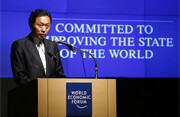From the 1960s through the first half of the 1990s, Americans who focused on the U.S.-Japan security relationship frequently criticized those of us working on bilateral economic issues. Economic and trade issues often involved American pressure on the Japanese government, which sometimes led to tension and negative exposure in the Japanese press. That pressure and tension, the security specialists argued, would spill over into the security relationship, which was the key aspect of bilateral relations. Given this history, I find it ironic that now it is the people working on security relations who are applying the pressure and causing tension that could spill over into other important aspects of the bilateral relationship.
Ironic or not, the recent tensions between the Department of Defense and the Hatoyama government illustrate the important role of summit meetings. The most important accomplishment of President Obama's trip to Japan would be to reassure Prime Minister Hatoyama that the tensions around Marine Corps Air Station Futenma will not interfere with the overall bilateral relationship. The broader agenda involves a number of important pending issues, including how to manage the global economic recovery, climate change policy, North Korea, and China. While the two governments may have differing views on these topics, cooperation is important. Jeopardizing cooperation by a general deterioration of attitudes due to disputes over the details of the security relationship would be unfortunate.
It is also ironic that the bilateral relationship has come to this point. In a very crude sense, both countries now have slightly left-of-center governments. Just as a rather conservative Koizumi government got along well with the conservative Bush administration, it would be natural for the Obama and Hatoyama governments to find much in common.
Why, then, did the bilateral relationship suddenly appear to deteriorate? The answer lies in the Department of Defense and the long history of the American military presence in Japan. The bilateral security relationship is certainly of great benefit to both nations, and the existence of American military bases in Japan is a key part of that relationship. It is also true that the United States has gotten a very good deal in Japan, and especially on Okinawa. The Japanese government provides substantial financial support for the bases, and local issues (noise, pollution, and crime) were largely ignored over the years by LDP governments. Consequently, the Defense Department became very complacent about the favorable deal for American bases in Japan.
One exception was the uproar created by the horrific rape case in 1995, which led to the agreement to reduce the American "footprint" in Okinawa. Given that the original agreement with the United States was reached in 1996 and the details not finalized until 2006, the Japanese government obviously had difficulty working out a deal with the Okinawa prefectural government concerning relocation of Futenma. But this problem was largely between the central government and the prefecture. Meanwhile, the Americans continued to use the air station.
Now the Defense Department faces a new government that is not as compliant, but DoD is very reluctant to renegotiate any aspect of the existing Futenma agreement, or any other aspects of the American presence in Japan. If one truly believes in the strategic value of keeping a Marine Corps helicopter base in Okinawa, then perhaps this reluctance is understandable. But if the strategic importance is somewhat exaggerated, as I believe, then the real issue is inertia—a simple desire to maintain the existing favorable treatment of American bases.
All this reminds me of bilateral trade negotiations in the mid-1990s. For many years the U.S. side occasionally used (or threatened to use) unilateral retaliatory actions to restrict imports as part of its bargaining tactic to open markets in Japan, and the Japanese government always made eventual concessions. Suddenly the Japanese government fought back—as in its decision to challenge the United States at the WTO when the Clinton administration imposed punitive tariffs on luxury cars from Japan in June 1995 (to pressure the Japanese government in negotiations to improve foreign access to the car market in Japan). Once the Americans got over the initial shock, they adjusted to the new reality. The Department of Defense needs to get over its shock and adapt to a new reality as well. In the end, neither government will get as much as it wants on maintaining or changing the framework for American bases, but compromise is the essence of a close relationship.
Edward J. Lincoln is the director of the Center for Japan-U.S. Business and Economic Studies and Professor of Economics at New York University Stern School of Business. This article originally as a Japanese-language version for WEDGE Infinity.




